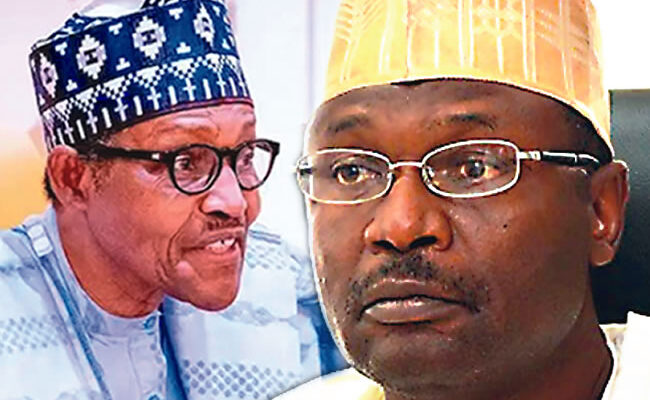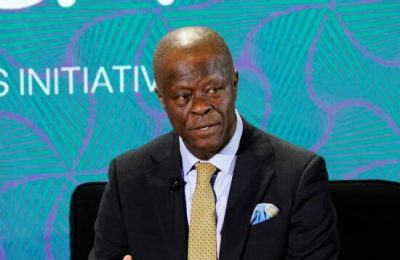Again, there is anxiety over the conduct of the general election, following serious security issues across the country. This is in spite the umpteenth assurance given by President Muhammadu Buhari and heads of law enforcement agencies that there is no cause to fear, writes KUNLE ODEREMI.
FOR the purpose of the general election, the national assembly appropriated the sum of N318 billion for the Independent National Electoral Commission (INEC). The chairman of the commission, Professor Mahmood Yakubu had persistently called for an earnest appropriation of the necessary funds to enable the INEC step up preparations for the seventh general election after the country returned to civilian rule in 1999. Yakubu is on the same page with many other critical stakeholders on the necessity for proper funding and logistics required for the poll.
A major concern of other categories of stakeholders in the build up to the elections is the serious challenge posed by insecurity. Their worries are underlined by the trajectories of past elections, which were almost truncated by security threats and breaches. Due to exigencies, the INEC was either forced to either suspend or reschedule the elections to enable the authorities create more conducive climate for the conduct of the polls in the past.

Bothered by what they perceive as the precarious state of insecurity across the country, many have also expressed deep concern on the fate of the forthcoming general election in the country. With just 45 days to the first election, presidential and national Assembly poll, they are of the belief that the authorities have not adequately matched their assurances with pragmatic actions that the situation is actually under control. INEC chairman is subjected to interrogations by concerned individuals and groups, especially the Civil Society Organisations on what they described as the frightening level of insecurity in parts of the country as the dates for the elections approach. The apprehension became more pronounced following the escalating violent attacks by some elements on the offices of INEC and other facilities.
Whereas Yakubu has continued to explain that it was not strictly within INEC purvey and mandate to provide security, there is sustained pressure on the commission on the challenged posed by the threat. Under the law, the mandate on maintaining and guaranteeing internal security is within the primary responsibility of the Police, NSDC and the Department of State Service, among other law enforcement agencies. The commission, according to Yakubu, has to synergise and engage those agencies in the areas of security without mortgaging the standard global practices on the conduct of elections.
The series of such engagements have been manifest in the promises by the heads of the law enforcement agencies that insecurity would be tamed to pave way for the elections from next month. The headship of the Armed Forces has also assured the populace of a congenial atmosphere for the elections to hold. Even President Muhammadu Buhari has expressed optimism that the necessary climate for a peaceful, free, fair and credible poll would prevail.
However, the rising spate of insecurity at the threshold of the elections is beginning to spark a number of theories. One of them is the presumption of a plan by some unscrupulous forces to create confusion such that the elections could be delayed for some time. Those behind such school of thought claim the authorities could seek the constitutional approval to keep the poll in abeyance to restore sanity that guarantee the conduct of the poll. The second theory is on the activities of a section of the political elite opposed to the deployment of the Bimodal voter Accreditation System (BVAS) and INEC result Viewing Portals (IReV). The disposition of the group elicited hoopla, with strident criticisms from within and outside the major political parties, candidates and the general public, who believe there was more to the opposition to the use of the modern technologies in the nation’s electoral process. The third theory is being linked to those forces said to be pushing for the onster of Yakubu as INEC chairman. The assumption is that they might be out to explore other options targeted at achieving their ultimate aim of exiting the INEC boss from office. Some of those that share this sentiment readily cite the circumstances that led to curious exit of a former Chief justice of the Federation (CJN), Justice Walter Onnoghen in 2019. The Coalition of United Political parties (CUPP) raised the alarm about the alleged plot to remove Yakubu, before it culminated into litigation, claims and counter-claims by some authorities and individuals recently. The CUPP spokesperson, Ikenga Ugochinyere, had said: “We will continue to act within the ambit of the law, but we are not going to run away or surrender to those who want to destroy what they did not build and what does not belong to them. We are ready for the election and will keep vigilance and not allow our electoral process to be derailed.”

At a public hearing by the House of Representatives Ad-hoc Committee investigating attacks on INEC offices and facilities in December last year, Yakubu underlined the grave danger of the attacks on the coming general election. He said while he and his team were resolute in their preparations for the elections, “should such attacks continue at the pace at which they are happening at the moment, the Commission may find it increasingly difficult to recover in good time for the election.” He added: “The attacks have far-reaching implications on preparation for the general election. First, the facilities that are destroyed, especially offices, would take time to rebuild. They are not like items of procurement that you can procure off the shelf. So, an alternative arrangement has to be made. In some of the states, in addition to these malicious attacks, other matters that have arisen as a result of fire and flooding, we would have to make alternative arrangements by renting. In some places, we can find facilities to rent. In some of the remote areas, we may not find facilities to rent. So, we have to look for alternatives to damaged facilities.” Therefore he restated the urgency for synergy between the INEC and security agencies .
Then, the Inspector General of Police (IGP), Usman Baba Alkali, had promised a new lease of life against the state of insecurity. He had blamed politicians for exacerbating the security situation prevalent across the country. “When INEC finally lifted ban on campaigns, the campaigns commenced and what we realised initially was inter and intra-party disputes. We realised that members of political parties were destroying billboards, posters and campaign offices in some part of the states,” he said. But he complained about inadequate manpower and other tough challenges facing the police. “The police is handicapped, as most of the people arrested are connected to high places. Police is under-staffed. We are not up to 400,000. We lack manpower. We need additional funding for recruitment. We lose personnel everyday and we need to replace,” he stated.
Way out of conundrum
There are suggestions from prominent persons and pressure groups on how the country could manage the conundrum of insecurity to have a credible poll. The latest outcry by Yakubu on the implications of insecurity on the election included the inherent valve in the Electoral Act 2022 against those perpetrating the evil act and their sympathisers. Citing relevant portions of the legislation, he said elections in troubled constituencies risk cancellation. «It is in line with the novel provisions in the electoral Act to guide against some inadequacies that characterised past elections, especially concerning security breaches and other forms of sharp practices during elections,» he siad. Yakubu highlighted some of the provisions in the Electoral Act 2022. He said: “We are also aware that there is a new Electoral Legal Framework that will guide the 2023 as a result of the enactment of the Electoral Act 2022 which prompted the review of the INEC Regulations and Guidelines for Conduct of Elections 2022. In particular, Sections 47(2), 60(1, 2 & 5), 62(1), 64(4a & 4b) and 64(5) of the Electoral Act 2022, which confers INEC with the power to use any technological device to transmit or transfer election results electronically are instructive in this regard.” And for the Inter Party Advisory Council (IPAC), there is a need for caution not to jeopradise the democratic process being enjoyed by Nigerians in spite of some teething problems. IPAC National Chairman, Engineer Yabagi Sani warned those he described as reactionary forces to desist from their plots to truncate civil rule. “Council will resist any attempt to jeopardize the ongoing electoral process that will deepen and strengthen our civil rule,” he emphasised.
ALSO READ FROM NIGERIAN TRIBUNE







